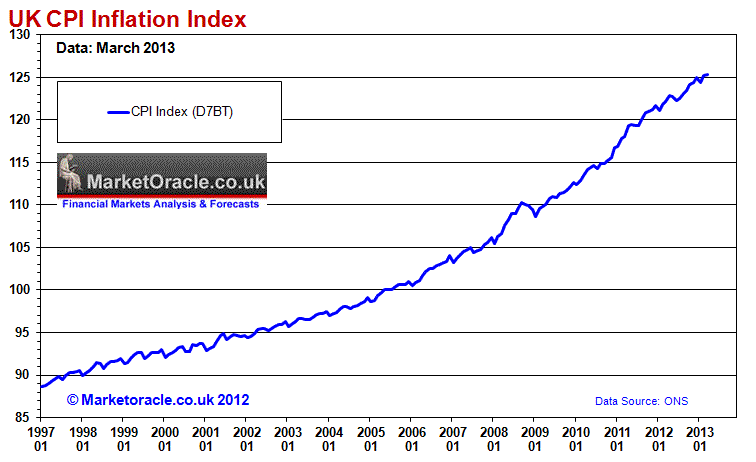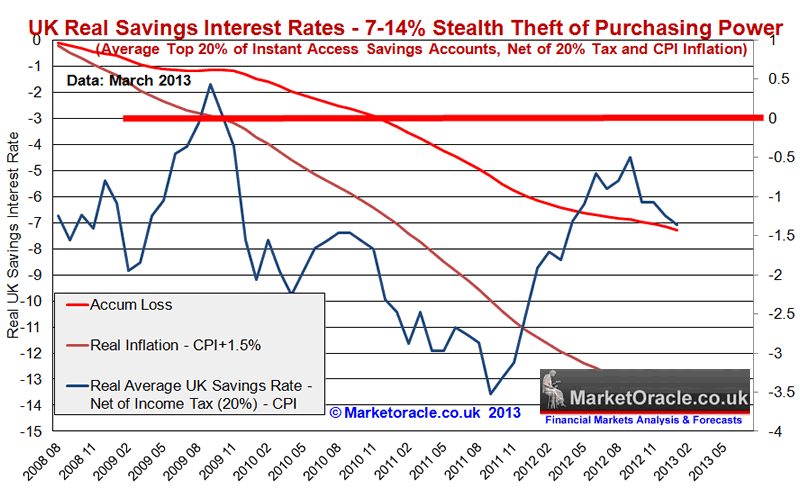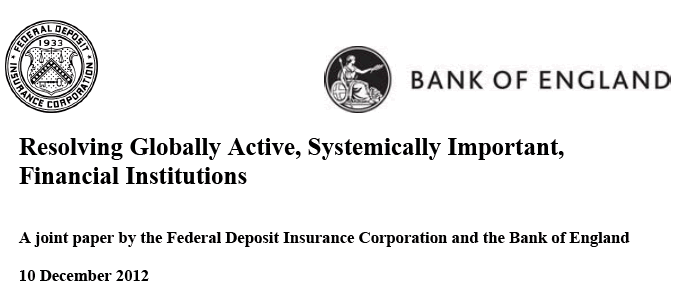Bank of England Celebrates 50 Months of Stealth Inflation Theft From Savers and Tax payers
Interest-Rates / UK Interest Rates May 09, 2013 - 05:49 PM GMTBy: Nadeem_Walayat
 The Bank of England today kept interest on hold at 0.5% for the 50th month, as Britain's central bank continues to support its bankster brethren in the crime syndicate that calls itself Britain's banks who continue to literally get away with crimes without any real consequences as evidenced by the over 6 year old LIBOR scandal that the mainstream press and financial regulator only awoke to mid last year. As far as I am ware no one has gone to prison for this mega-fraud, instead the CEO's of Britians major banks have been retired on mega-pension handouts whilst all of the fines are at the end of the day being picked up by British tax payers.
The Bank of England today kept interest on hold at 0.5% for the 50th month, as Britain's central bank continues to support its bankster brethren in the crime syndicate that calls itself Britain's banks who continue to literally get away with crimes without any real consequences as evidenced by the over 6 year old LIBOR scandal that the mainstream press and financial regulator only awoke to mid last year. As far as I am ware no one has gone to prison for this mega-fraud, instead the CEO's of Britians major banks have been retired on mega-pension handouts whilst all of the fines are at the end of the day being picked up by British tax payers.
For instance the hundreds in million in fines for the likes of RBS are only the tip of the iceberg for this near wholly tax payer owned bank will soon be hit for claims for tens of billions in damages that Britians tax payers WILL foot the bill for, because the consequences would be bankruptcy which is something that we have repeatedly witnessed that the Government nor the Bank of England will ever entertain.

Therefore in the name of continuing to save Britain's criminal banks the Bank of England continues to funnel tax payer cash into their coffers, not only to meet the existing scandals such as PPI mis-selling but the long string of ever escalating bank rescues that will follow such as LIBOR as tax payers continue to be literally bled dry as the Bank of England's brethren bank billions in bonuses on the basis of fictitious profits.
Britians' Savers and Workers Continue to Pay the Price
Britians' savers and workers continue to pay the price for over 5 years of artificially low interest rates as the Bank of England continues to print money to monetize government debt and drive down all interest rates in the economy the consequences for which is for persistently sub-inflation rates of interest that ensures that depositor cash over the coming decade will be stolen in MOST part as I warned several years ago and as iterated in the January 2010 Inflation Mega-trend Ebook (Free download), whilst the Bank of England continues to attempt to keep the general population sedated with the economic propaganda mantra of the always imminent risk of deflation something that was NEVER probable but just an excuse for the stealth theft of wealth by means of high real inflation which exists even on the governments own highly suspect official CPI measure of inflation that tends to under-report real inflation by approx 1.5% per annum.
Instead Britians' savers and workers continue to be impacted by the consequences of the EXPOENTIAL inflation mega-trend as illustrated by the below graph that clearly demonstrates the deflation of the great recession of 2008-2009 that vested interest academic economists that populate the mainstream press continue to regurgitate amounts to nothing more than an inconsequential blip.

The impact on savers of the inflation stealth theft is worsened by the 20%-40% additional theft by means of double taxation on savings interest i.e. Inflation erodes the value of your savings by currently about 4% then the government taxes you by 20% to 40% on the sub inflation interest rate you will be in receipt of which means that savers are guaranteed to lose near 2% of the value of savings per year that amounts to an estimated theft of 14% over the past 5 years.

To protect oneself from the global inflation war against savings, savers need to increase risk i.e. if you invest in the stock market then you need to appreciate the fact that it will be far higher risk then leaving it in the bank even if you WILL lose at least 2% per annum in the bank.
Cyprus Shows that Ultimately Your Bank Deposits Will be Stolen
You think a Cyprus style theft cannot happen here ?
Think again, because when the chips are down and the Government has its back against the wall then it WILL happen and it would be far worse than that which took place in Cyprus for the fact that Britain is NOT in the Euro-zone, therefore our currency would plunge WHILST savings are frozen, whilst the government formulates a hair-cut xx%.
The net result would be that ALL Savers would lose, no one would be left standing as inflation would ensure that even if savers escaped the hair-cut they would only get back a fraction of the value of their money after the hair-cut which is why for several years I have been advocating an exodus out of bank deposits and into inflation proof assets such as stocks and since early 2012 property as illustrated by the January 2010 Inflation Mega-trend Ebook (FREE DOWNLOAD).
Cyprus is not the guinea pig for something new for ALL central banks including the Bank of England have plans for theft of depositor funds to recapitalize banks in the event of a re-run of 2008 or Cyprus 2013, or the soon to follow Greece, Portugal, Spain, Italy and Ireland.
The evidence for this 'bail-in' can be found in the Bank of England's own documents as the following except illustrates from a document dated 10th of December 2012 - http://www.bankofengland.co.uk/publications/Documents/news/2012/nr156.pdf

Resolving Globally Active, Systemically Important, Financial Institutions Federal Deposit Insurance Corporation and the Bank of England
Executive summary
The financial crisis that began in 2007 has driven home the importance of an orderly resolution process for globally active, systemically important, financial institutions (G-SIFIs). Given that challenge, the authorities in the United States (U.S.) and the United Kingdom (U.K.) have been working together to develop resolution strategies that could be applied to their largest financial institutions. These strategies have been designed to enable large and complex cross-border firms to be resolved without threatening financial stability and without putting public funds at risk. This work has taken place in connection with the implementation of the G20 Financial Stability Board’s Key Attributes of Effective Resolution Regimes for Financial Institutions. The joint planning has been productive and effective. It has enhanced the resolution planning process in both jurisdictions, tackled key issues in relation to crossborder coordination, and identified potential challenges that will be addressed through further work.
This paper focuses on the application of “top-down” resolution strategies that involve a single Such a strategy would involve the bail-in (write-down or conversion) of creditors resolution authority applying its powers to the top of a financial group, that is, at the parent company level. The paper discusses how such a top-down strategy could be implemented for a U.S. or a U.K. financial group in a cross-border context.
In the U.S., the strategy has been developed in the context of the powers provided by the Dodd-Frank Wall Street Reform and Consumer Protection Act of 2010. Such a strategy would apply a single receivership at the top-tier holding company, assign losses to shareholders and unsecured creditors of the holding company, and transfer sound operating subsidiaries to a new solvent entity or entities.
In the U.K., the strategy has been developed on the basis of the powers provided by the U.K. Banking Act 2009 and in anticipation of the further powers that will be provided by the European Union Recovery and Resolution Directive and the domestic reforms that implement the recommendations of the U.K. Independent Commission on Banking. at the top of the group in order to restore the whole group to solvency.
Both the U.S. and U.K. approaches ensure continuity of all critical services performed by the operating firm(s), thereby reducing risks to financial stability. Both approaches ensure activities of the firm in the foreign jurisdictions in which it operates are unaffected, thereby minimizing risks to cross-border implementation. The unsecured debt holders can expect that their claims would be written down to reflect any losses that shareholders cannot cover, with some converted partly into equity in order to provide sufficient capital to return the sound businesses of the G-SIFI to private sector operation. Sound subsidiaries (domestic and foreign) would be kept open and operating, thereby limiting contagion effects and crossborder complications. In both countries, whether during execution of the resolution or thereafter, restructuring measures may be taken, especially in the parts of the business causing the distress, including shrinking those businesses, breaking them into smaller entities, and/or liquidating or closing certain operations. Both approaches would be accompanied by the replacement of culpable senior management.
The above text clearly implies that a bail-in of all creditors will be involved in the case of bankruptcy to recapitalize the bankrupt banks.
I won't post the whole document but again refer to an excerpt that makes it clear that only insured depositors will be protected i.e. holdings of less than £85,000 per banking licence.
U.K. regime 17 In the U.K., the Banking Act provides the Bank of England with tools for resolving failing deposit-taking banks and building societies.5 Powers similar to those of the FDIC are available, including powers to transfer all or part of a failed bank’s business to a private sector purchaser or to a bridge bank until a private purchaser can be found. The Banking Act also provides the U.K. authorities with a bespoke bank insolvency procedure that fully protects insured depositors while liquidating a failed bank’s assets. These powers have proved valuable; for example, during the crisis they allowed the authorities to transfer the retail and wholesale deposits, branches, and a significant proportion of the residential mortgage portfolio of a failed building society to another building society.
This further reinforces the fact that savers have to take some risk with their capital be it in the stock market or the housing market or commodities because as things stand you are guaranteed to lose at least 1/3rd of the real value of your bank deposits during this decade, with the ever prevalent risk that in a worse case scenario the Government WOULD Cyprus style outright steal ALL of your money in the bank.
FOCUSED MESSAGE
If you want to take one message away from ALL that I have written over the years then take note of this - The Exponential Inflation Mega-trend Can ONLY TREND in ONE Direction which is to ACCELERATE - You need to consider this in how you view risk vs reward with respect to your wealth. In the long-run your wealth can only survive if it is indexed to Inflation which means being invested in assets that cannot be easily printed such as the housing market or are leveraged to inflation such as consistently increasing dividend stocks.
Meanwhile Britain's politicians are dancing around the issue of In or Out of Europe when the REAL FUNDEMNENTAL ISSUE IS RAMPANT OUT OF CONTROL DEBT AND MONEY PRINTING AND ITS ACCELERATING INFLATION CONSQUENCES!
To get my next in-depth analysis in your email in box, ensure you are subscribed to my ALWAYS FREE newsletter.
Source and Comments: http://www.marketoracle.co.uk/Article40371.html
Nadeem Walayat
Copyright © 2005-2013 Marketoracle.co.uk (Market Oracle Ltd). All rights reserved.
Nadeem Walayat has over 25 years experience of trading derivatives, portfolio management and analysing the financial markets, including one of few who both anticipated and Beat the 1987 Crash. Nadeem's forward looking analysis focuses on UK inflation, economy, interest rates and housing market. He is the author of four ebook's in the The Inflation Mega-Trend and Stocks Stealth Bull Market series.that can be downloaded for Free.
 Nadeem is the Editor of The Market Oracle, a FREE Daily Financial Markets Analysis & Forecasting online publication that presents in-depth analysis from over 600 experienced analysts on a range of views of the probable direction of the financial markets, thus enabling our readers to arrive at an informed opinion on future market direction. http://www.marketoracle.co.uk
Nadeem is the Editor of The Market Oracle, a FREE Daily Financial Markets Analysis & Forecasting online publication that presents in-depth analysis from over 600 experienced analysts on a range of views of the probable direction of the financial markets, thus enabling our readers to arrive at an informed opinion on future market direction. http://www.marketoracle.co.uk
Disclaimer: The above is a matter of opinion provided for general information purposes only and is not intended as investment advice. Information and analysis above are derived from sources and utilising methods believed to be reliable, but we cannot accept responsibility for any trading losses you may incur as a result of this analysis. Individuals should consult with their personal financial advisors before engaging in any trading activities.
Nadeem Walayat Archive |
© 2005-2022 http://www.MarketOracle.co.uk - The Market Oracle is a FREE Daily Financial Markets Analysis & Forecasting online publication.







